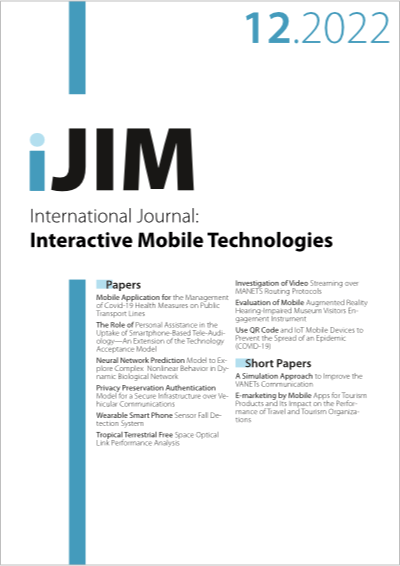Privacy Preservation Authentication Model for a Secure Infrastructure over Vehicular Communications
DOI:
https://doi.org/10.3991/ijim.v16i12.31533Keywords:
ITS, VANET, Privacy Preservation, Authentication, ECDH, EdDSAAbstract
Vehicle Ad-hoc Networks (VANET) are considered among recent wireless communication technologies. Nowadays, vehicles are no more than simple means of transport, they are endowed with a source of intelligence through their interaction with the road environment due to embedded equipment on board vehicles and integrated into stations along roads and highways. The mechanisms of security and protection of messages exchanged in VANET, thus preserving the privacy of users and satisfying the various security requirements, are a prerequisite for the deployment of vehicle networks. Increasingly, several research have been proposed to improve protocols for maintaining security and preserving privacy. This paper presents a hierarchical revocable infrastructure based privacy preservation authentication protocol for vehicles that involves authentication of each vehicle and the corresponding Road Side Unit (RSU) by a Certification Authority (CA). The proposed protocol used Elliptic Curve Diffie Hellman (ECDH) algorithm for reliable key exchange and Edwards-curve Digital Signature Algorithm (EdDSA) to speed up the execution of the authentication process especially at the key management level, message signing and verification of this signature. On the other hand, the creation of sub-lists of revoked certificates based on vehicle type makes it possible to minimize the response time by looking for a certificate if it is revoked or not. Our solution was checked by the security verification tool, Automated Validation of Internet Security Protocols and Applications (AVISPA), which indicated that it is a very secure level. Performance analysis illustrates that the protocol greatly saves computation resources.
Downloads
Published
How to Cite
Issue
Section
License
Copyright (c) 2022 Soukayna Riffi Boualam, Dr. Mariyam Ouaissa, Dr. Mariya Ouaissa, Prof. Dr. Abdellatif Ezzouhairi

This work is licensed under a Creative Commons Attribution 4.0 International License.



